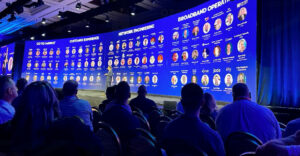
Having induced the Federal Communications Commission to open up the C block of wireless airwaves at the recent wireless auction, Google is now seeking access to another set of airwaves in pursuit of openness.
This time, it wants to open up the unlicensed parts of the TV broadcast spectrum, the so-called white space, for wireless broadband Internet access.
“The data speeds are comparable with the 700 MHz spectrum, so you could have alternative ISPs and wireless cell carriers and data access which could be provided at lower cost than cable Internet or from current wireless carriers, and if you have nationwide service with comparable quality, they would be competitive with wireless carriers and existing ISPs,” Greg Sterling, founding principal of Sterling Market Research, told TechNewsWorld.
In the Name of the People
Google’s take on this issue, as it was when it forced the FCC to open up access to the C block of the 700 MHz wireless spectrum, is that this is good for all Americans.
In other words, Google sees itself as a white knight propounding Web access ubiquity, though its own interests certainly factor into the equation.
In a March 21 letter to the FCC, Google suggested that its forthcoming Android phone could be used with the white spaces to “provide uniquely low-cost mobile broadband coverage for all Americans,” and that it is “willing to provide, at no cost to third parties,” the technical support they would need to create applications or content for consumers to download from the white spaces — in other words, the Android SDK, which Google released recently.
Raising Hackles
These Android devices would not have to be licensed by the FCC, and that has led to strong opposition to Google’s idea.
The National Association of Broadcasters (NAB), a trade association that advocates on behalf of more than 8,300 free, local radio and television stations and broadcast networks, is leading the charge against Google.
“We oppose quite strongly the notion of these unlicensed portable devices that we believe would cause severe interference to the digital TV viewing experience,” NAB Executive VP of Media Relations Dennis Wharton told TechNewsWorld. “They’re looking to get a free ride from the FCC on very valuable spectrum.”
The NAB would prefer that the airwaves be auctioned off so that the government “would get revenue from the winning bidder and this would go to pay the national debt,” Wharton said.
To date, 70 lawmakers have expressed concern over the use of unlicensed personal-portable devices in the broadcast spectrum. They are listed on NAB’s Website.
Second Bite at the Apple
This is the second time Google is trying to get at the TV white space.
Last year, it formed the White Spaces Coalition with Dell, EarthLink, HP, Intel, Microsoft and Philips to “persuade the FCC to establish appropriate interference standards that would allow entrepreneurs to develop fixed and mobile devices that utilize these airwaves,” said Richard Whitt, Google’s Washington Telecom and Media Counsel. Whitt is spearheading the battle over white spaces.
Last year, the FCC was given five prototype devices that can use the white spaces for testing. Two, from Microsoft and Philips, were submitted by the White Spaces coalition to the FCC, but one failed tests and the other was accidentally broken.
The others were submitted by Motorola, Google and Adaptrum, former FCC chairman Michael Marcus said in his blog. Marcus, a Fellow of the IEEE, presided over policies that enabled spread spectrum/CDMA and creation of the rules for WiFi and Bluetooth and is now a consultant.
Money Is the Key
Notwithstanding its protestations of supporting the consumer, Google’s white space plan is really just another way to garner revenue, JupiterResearch analyst Neil Strother told TechNewsWorld.
As long as people access the Internet, whether over land lines or wirelessly, and Google remains part of the action, “with advertising being their whole money engine at this point, they can soak up whatever they can without being totally monopolistic,” Strother said.
“They can say, ‘Hey, we’re just pushing the technology to the limit and we take fair advantage of that, and that’s just business,'” he added.
That doesn’t sit well with the NAB. “Google again wants to get this spectrum for free without paying anything and then potentially disrupt digital TV service for hundreds of millions of Americans, and we don’t think it’s something the public will stand for,” Wharton said. “Maybe Google and Microsoft are familiar with system failures with computers, but broadcasters and viewers won’t accept it.”
About 100 million households spend more than eight hours a day on average watching television, Wharton said, and “the question is whether we’re going to jeopardize that service with this unproven technology so that Google can make a few extra million or tens of millions or hundreds of millions of dollars.”






















































There are not "hundreds of millions" of people that will be getting OTA digital programming as there are only about 300 million Americans. People who get programming through cable or satellite would be unaffected by any interference caused in the white space. Articles like this can further confuse people about the digital change over, but I’m sure the TV manufacturers are more than happy to have people (cable and satellite customers) buying digital TVs because they think theirs will no longer work in 2009.
Screw CABLE all they do is rip customers off anyway. Google rocks, and all they are trying to do is make the internet and communications in this country better. Google… Keep doing what you are doing, you are doing a great job.